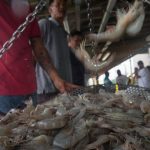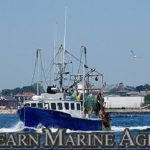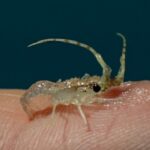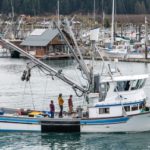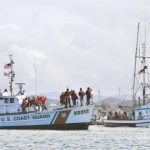Tag Archives: Atlantic Striped Bass
NCFA Weekly Update for December 16, 2024 – Atlantic Striped Bass, Yet Another Discard Fishery
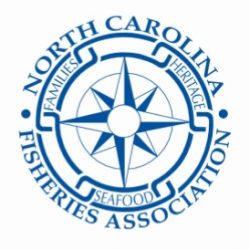 The Atlantic States Marine Fisheries Commission’s (ASMFC) Atlantic Striped Bass Management Board meets today (December 16th) from 10:00am to 2:00pm. Although North Carolina does not really have an Atlantic striped bass fishery anymore, the issues facing striped bass is the same thing we are seeing with many other stocks. For years we have only regulated harvest; limiting harvest days for recreational and commercial fishermen, increasing minimum size limits, lowering bag and trip limits, setting small slot limits, closing areas to commercial gear, modifying commercial gear; never ending harvest restrictions. Sound familiar? more, >>CLICK TO READ<< 10:45
The Atlantic States Marine Fisheries Commission’s (ASMFC) Atlantic Striped Bass Management Board meets today (December 16th) from 10:00am to 2:00pm. Although North Carolina does not really have an Atlantic striped bass fishery anymore, the issues facing striped bass is the same thing we are seeing with many other stocks. For years we have only regulated harvest; limiting harvest days for recreational and commercial fishermen, increasing minimum size limits, lowering bag and trip limits, setting small slot limits, closing areas to commercial gear, modifying commercial gear; never ending harvest restrictions. Sound familiar? more, >>CLICK TO READ<< 10:45
Wanchese fisherman pleads guilty to federal charges
 Gaston L. Saunders, 53, of Wanchese, pled guilty on Aug. 3 to federal charges regarding the illegal harvest and sale of Atlantic striped bass from federal waters. The charges stem from a 2010 Lacey Act investigation by NOAA, assisted by the Coast Guard. Since 1990, there has been a ban on harvesting Atlantic striped bass in the Exclusive Economic Zone (EEZ), which spans between three miles and 200 miles seaward of the coastline. Eleven other commercial fishermen have entered guilty pleas for conduct uncovered in the investigation. Saunders also pled guilty to one count of federal tax evasion and three counts of failure to file federal taxes. In the plea agreement, he agreed to pay restitution in the amount of $544,946.35 payable to the Internal Revenue Service. A sentencing hearing will be set at a later date. Saunders faces a total maximum sentence of 13 years imprisonment and/or a $800,000 fine. click here to read the story 14:19
Gaston L. Saunders, 53, of Wanchese, pled guilty on Aug. 3 to federal charges regarding the illegal harvest and sale of Atlantic striped bass from federal waters. The charges stem from a 2010 Lacey Act investigation by NOAA, assisted by the Coast Guard. Since 1990, there has been a ban on harvesting Atlantic striped bass in the Exclusive Economic Zone (EEZ), which spans between three miles and 200 miles seaward of the coastline. Eleven other commercial fishermen have entered guilty pleas for conduct uncovered in the investigation. Saunders also pled guilty to one count of federal tax evasion and three counts of failure to file federal taxes. In the plea agreement, he agreed to pay restitution in the amount of $544,946.35 payable to the Internal Revenue Service. A sentencing hearing will be set at a later date. Saunders faces a total maximum sentence of 13 years imprisonment and/or a $800,000 fine. click here to read the story 14:19
Illegal striped bass harvest means trouble for N.C. commercial fishermen – By Fred Bonner
 Apparently, the good management practices worked because today the population of Atlantic striped bass is now considered to be “fully recovered.” This is why many North Carolinians, including many sport as well as commercial fishermen, were upset when 13 commercial fishermen in North Carolina and Georgia were charged in federal court in Raleigh for their role in the illegal harvest, sale and false reporting of approximately 90,000 pounds of Atlantic striped bass. Read the rest here 16:28
Apparently, the good management practices worked because today the population of Atlantic striped bass is now considered to be “fully recovered.” This is why many North Carolinians, including many sport as well as commercial fishermen, were upset when 13 commercial fishermen in North Carolina and Georgia were charged in federal court in Raleigh for their role in the illegal harvest, sale and false reporting of approximately 90,000 pounds of Atlantic striped bass. Read the rest here 16:28
12 Eastern Carolina commercial fishermen charged with illegally harvesting and selling Atlantic Striped Bass
 Thirteen commercial fishermen in North Carolina and Georgia have been charged in federal court in Raleigh for their role in the illegal harvest and sale and false reporting of approximately 90,000 pounds of Atlantic striped bass from federal waters off the coast of North Carolina during 2009 and 2010, according to the . This investigation began as a result of the U.S. Coast Guard boarding of the fishing vessel Lady Samaira in February 2010, based on a complaint that multiple vessels were fishing Striped Bass illegally. Read the rest here 09:05
Thirteen commercial fishermen in North Carolina and Georgia have been charged in federal court in Raleigh for their role in the illegal harvest and sale and false reporting of approximately 90,000 pounds of Atlantic striped bass from federal waters off the coast of North Carolina during 2009 and 2010, according to the . This investigation began as a result of the U.S. Coast Guard boarding of the fishing vessel Lady Samaira in February 2010, based on a complaint that multiple vessels were fishing Striped Bass illegally. Read the rest here 09:05
Coast Guard to intensify efforts to stop offshore poaching of Atlantic striped bass
![]() In an effort to ensure the health of the striped bass population, the Coast Guard is working to raise awareness of the federal regulations stating Atlantic striped bass may not be caught, harvested or possessed in the Exclusive Economic Zone. The EEZ begins three nautical miles from shore and extends out to 200 nautical miles. more@uscgnews 15:12
In an effort to ensure the health of the striped bass population, the Coast Guard is working to raise awareness of the federal regulations stating Atlantic striped bass may not be caught, harvested or possessed in the Exclusive Economic Zone. The EEZ begins three nautical miles from shore and extends out to 200 nautical miles. more@uscgnews 15:12
Atlantic States Marine Fisheries Commission: Atlantic Striped Bass not overfished or experiencing overfishing
 That’s right! After this week’s meeting we’re pleased to announce that the recent benchmark assessment indicates that the Atlantic Striped Bass resource is not overfished or experiencing overfishing relative to proposed new reference points defined in the assessment. [email protected] 12:14
That’s right! After this week’s meeting we’re pleased to announce that the recent benchmark assessment indicates that the Atlantic Striped Bass resource is not overfished or experiencing overfishing relative to proposed new reference points defined in the assessment. [email protected] 12:14
Coast Guard reminds fishermen of Atlantic Striped Bass restrictions
The Coast Guard reminds recreational, charter and commercial fishermen of the ongoing moratorium of Atlantic Striped Bass in the exclusive economic zone of the U.S., which includes all waters from three nautical miles offshore to 200 nautical miles. Read more


































